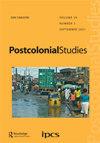Empire remembered: the intimate economy of tea in Assam and the making of ‘Chameli Memsaab’
IF 1.8
3区 社会学
Q2 CULTURAL STUDIES
引用次数: 0
Abstract
ABSTRACT This essay examines the complex intertwining of colonial and postcolonial subjectivities in the making of memories about the colonial past. The essay uses literature and cinema as archive and intersubjectivity as the lens to argue that memories of the Empire are culled in the complex intersection of the subjective experiences of the individual and a community's collective perceptions of the past and the present. Accordingly, the essay calls for due diligence to the immediate postcolonial context in which the colonial memory project is ordained. At a more elementary level, the essay argues that the reduction of colonial experiences to a conflictual negation of the imperialist project impairs our understanding of the myriad factors mediating the colonial encounter. The polysemy of colonial memories reflects the multiplicity of intersubjective exchanges within a community. In this case, the Assamese short story, ‘Chameli Memsaab', written by Nirode Choudhury, and describing the affection of a benign planter sahib for Chameli, a coolie woman, becomes our focal point for entry into the neglected domain of Assamese literary representations of the European planter, that put a gloss on the dark side of Plantation abuses in Assam, to project the plantation economy as a desirable addendum to the Raj. Our survey of short stories written in Assamese, in the nineteenth and the twentieth centuries, reveal a profoundly ambivalent attitude towards the unequal sexual exchange between the European sahib and the coolie woman, which we call ‘the intimate economy of tea’ in Assam, and which, as the coercive underside of the economy, denuded the production relations on the plantations of their putatively capitalist character.帝国记忆:阿萨姆邦亲密的茶叶经济和“Chameli Memsaab”的制作
摘要本文探讨了殖民时期和后殖民时期的主体性在殖民历史记忆中的复杂交织。这篇文章以文学和电影作为档案,以主体间性为镜头,论证了帝国的记忆是在个人主观体验和社会对过去和现在的集体感知的复杂交集中被挑选出来的。因此,本文呼吁对殖民记忆项目被任命的直接后殖民背景进行尽职调查。在更初级的层面上,本文认为,将殖民经历简化为对帝国主义计划的冲突否定,损害了我们对调解殖民遭遇的无数因素的理解。殖民记忆的多义性反映了社区内主体间交流的多样性。在这种情况下,由Nirode Choudhury撰写的阿萨姆邦短篇小说《Chameli Memsaab》描述了一个善良的种植园主sahib对一个苦力女人Chameli的感情,成为我们进入阿萨姆邦文学中被忽视的欧洲种植园主代表领域的焦点,它为阿萨姆邦种植园滥用的阴暗面涂上了一层光,将种植园经济作为Raj的理想补充。我们调查了19世纪和20世纪用阿萨姆语写的短篇小说,揭示了对欧洲贵族和苦力妇女之间不平等的性交换的一种深刻的矛盾态度,我们称之为阿萨姆的“亲密的茶经济”,作为经济的强制阴面,它剥夺了种植园生产关系的资本主义特征。
本文章由计算机程序翻译,如有差异,请以英文原文为准。
求助全文
约1分钟内获得全文
求助全文

 求助内容:
求助内容: 应助结果提醒方式:
应助结果提醒方式:


